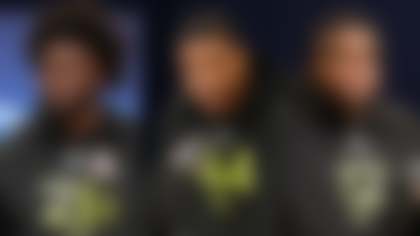Around The ╣·▓·═Ō┴„═°breaks down what you need to know from all of Sunday's action in Week 6 of the 2023 ╣·▓·═Ō┴„═°season. Catch up on each game's biggest takeaways using the links below:
SUNDAY NIGHT
LATE WINDOW
EARLY WINDOW
- Baltimore Ravens 24, Tennessee Titans 16 (London)
- Washington Commanders 24, Atlanta Falcons 16
- Minnesota Vikings 19, Chicago Bears 13
- Cincinnati Bengals 17, Seattle Seahawks 13
- Cleveland Browns 19, San Francisco 49ers 17
- Houston Texans 20, New Orleans Saints 13
- Jacksonville Jaguars 37, Indianapolis Colts 20
- Miami Dolphins 42, Carolina Panthers 21
TEAMS ON BYE
- Packers, Steelers
SUNDAY NIGHT


- READ: Giants QB Tyrod Taylor takes blame for end-of-half blunder
- READ: Bills survive scare from Giants on last-second pass breakup
Bobby Kownack's takeaways:
- Bills shake off London malaise just in time. BuffaloŌĆÖs offense started much the same way it did its loss in London last week -- only instead of four punts in a row before finally breaking through to the end zone, this time the Bills went scoreless for the entirety of the first half, punting three times, missing a field goal and turning it over twice. Luckily for their adoring Mafia, a different version of the Bills came out in the second half. Buffalo mounted an 84-yard touchdown drive that took 17 plays and 9:58, the teamŌĆÖs longest in terms of time since 2016. The Bills then followed that up with a 12-play drive that went 70 yards for another score. Those two possessions notably involved more offensive plays (29) than the entirety of BuffaloŌĆÖs first half (28). Josh AllenŌĆÖs TD passes went to the unheralded ’╗┐’╗┐’╗┐’╗┐’╗┐’╗┐Deonte Harty’╗┐’╗┐’╗┐’╗┐’╗┐’╗┐ and ’╗┐’╗┐’╗┐’╗┐’╗┐’╗┐Quintin Morris’╗┐’╗┐’╗┐’╗┐’╗┐’╗┐, but the BillsŌĆÖ ability to snap out of their funk undoubtedly hinged on ’╗┐’╗┐’╗┐’╗┐’╗┐’╗┐Stefon Diggs’╗┐’╗┐’╗┐’╗┐’╗┐’╗┐, who tied his season high with 10 catches and ran his streak of games with 100-plus receiving yards to four. The Bills we're used to showed up just in time to avoid a losing streak by the narrowest of margins.
- Boneheaded play beginning of end for Giants. Everything was going surprisingly well for Big Blue early. The Giants had held the Bills scoreless for the entire first half thanks to a swarming defense that forced two turnovers and some tight coverage that limited Josh Allen to 8-of-18 passing for 87 yards and a 36.1 first-half passer rating. New YorkŌĆÖs offense wasnŌĆÖt faring much better than BuffaloŌĆÖs, but there was a chance to take a two-possession lead -- either 13-0 or 9-0 -- to close out the first half. The Giants had the ball on the Buffalo 1-yard line with 14 seconds left and no timeouts when ’╗┐’╗┐’╗┐’╗┐Tyrod Taylor’╗┐’╗┐’╗┐’╗┐ appeared to check to a goal-line run. The Bills snuffed out ’╗┐’╗┐’╗┐’╗┐’╗┐’╗┐Saquon Barkley’╗┐’╗┐’╗┐’╗┐’╗┐’╗┐, took a little extra time allowing him to his feet and watched the clock hit triple zeroes. It was essentially the only play the Giants couldnŌĆÖt afford to try there, made even worse by how the endgame transpired. Despite the blunder, New York still had a chance to win on the final snap of the night, which, in a cruel twist of fate, took place again 1 yard from pay dirt. This time Taylor dropped back to throw. ’╗┐’╗┐’╗┐’╗┐’╗┐’╗┐Darren Waller’╗┐’╗┐’╗┐’╗┐’╗┐’╗┐ attempted to high-point the ball in the end zone with ’╗┐’╗┐’╗┐’╗┐’╗┐’╗┐Taron Johnson’╗┐’╗┐’╗┐’╗┐’╗┐’╗┐ in tight coverage, but it instead fell to the turf. Who knows what ripple effect the Giants properly managing the clock during their previous trip to the 1 mightŌĆÖve had, but as it stands, a chip-shot field goal wouldŌĆÖve been enough to win had they not erred so badly.
- Okereke, McFadden tag team for huge night in loss. Pitting the leagueŌĆÖs 29th-ranked scoring defense against an offense in the top three seemed likely to lead to a drubbing, but New YorkŌĆÖs previously hapless offense found a groove against the Bills for much of Sunday night. Those efforts were led by the linebacker duo of ’╗┐’╗┐’╗┐’╗┐’╗┐Bobby Okereke’╗┐’╗┐’╗┐’╗┐’╗┐ and ’╗┐’╗┐’╗┐’╗┐’╗┐Micah McFadden’╗┐’╗┐’╗┐’╗┐’╗┐. On BuffaloŌĆÖs second drive, Okereke stripped wide receiver ’╗┐’╗┐’╗┐’╗┐’╗┐Gabe Davis’╗┐’╗┐’╗┐’╗┐’╗┐ near midfield, allowing McFadden to recover for New York before the Bills could cross over into GiantsŌĆÖ territory. Four drives later, with the clock ticking down toward the two-minute warning, Okereke tipped a Josh Allen pass into McFaddenŌĆÖs waiting arms. Beyond playing the setup man to the second-year linebacker, Okereke also laid the lumber with consistency, leading with the team with 11 tackles (two for loss). The Bills ultimately persevered, but Okereke, McFadden and the rest showed their mettle by hanging with one of the AFCŌĆÖs best, even forcing Buffalo into a second missed field goal with 1:25 remaining to keep victory in sight. Had the offense capitalized, the defense couldŌĆÖve enjoyed their sterling night in full.
Next Gen stat of the game: Stefon Diggs finished with a reception on eight different routes while accounting for a season-high 65.5% of the Bills' air yards. He also had his highest target rate in a game this season (53.3% of his routes).
╣·▓·═Ō┴„═°Research: The Giants' shutout of the Bills through three quarters was BuffaloŌĆÖs first time going scoreless through three frames since Week 4, 2018 against the Packers (82 consecutive games).
LATE WINDOW
Nick Shook's takeaways:
- ’╗┐’╗┐’╗┐Brian Hoyer’╗┐’╗┐’╗┐ keeps Raiders afloat in win. ’╗┐’╗┐’╗┐Jimmy Garoppolo’╗┐’╗┐’╗┐ exited the game after the first half with a back injury, but the veteran Hoyer stepped in and didn't waste much time before making a big difference. His second pass, a third-and-4 strike over the middle to ’╗┐’╗┐’╗┐Tre Tucker’╗┐’╗┐’╗┐, went for 48 yards, helping the Raiders answer New England's half-opening touchdown drive with a march to a field goal. Hoyer made some errors, such as when he threw an uncatchable pass in tight end ’╗┐’╗┐’╗┐Michael Mayer’╗┐’╗┐’╗┐'s direction on third down (and did so again later on a third-down throw to ’╗┐’╗┐’╗┐Davante Adams’╗┐’╗┐’╗┐), but Hoyer prevented the Raiders' offense from sinking in a close game. He spread the ball around, and while he couldn't get the Raiders into the end zone, he did enough to give them a chance to win. That's all you can ask of a backup, especially one facing his former team. Head coach Josh McDaniels confirmed Garoppolo was transported to a local hospital after sustaining his injury, telling reporters after the game that he did not have any further update.
- Nothing is easy for the Patriots right now. New England performed better offensively than it had in the two previous weeks, but the bar was basically buried underground after mustering three points combined between Weeks 4 and 5. Seventeen points is indeed better. How they got them, though, was like pulling teeth. The Patriots needed a 17-play drive that lasted 9:30 to score their fourth-quarter touchdown to make it a two-point game, leaving themselves with little time to get a stop and mount a final drive. All three of their scoring drives took at least nine plays. And on that final attempt to take a late lead, ’╗┐’╗┐’╗┐Mac Jones’╗┐’╗┐’╗┐ threw one of his best passes of 2023 -- and ’╗┐’╗┐’╗┐DeVante Parker’╗┐’╗┐’╗┐ dropped it. The Pats were better, but they still weren't good enough, and the offensive line remains a mess of revolving characters. Insert your heavy sigh here.
- Las Vegas scores a team victory. The Raiders have been in their share of tight games in the past calendar year, and too often, they've ended up losing those types of games. Not on this Sunday, though. Las Vegas managed to travel deep into Patriots territory on most of its drives, and although the offense mustered only one touchdown, the team steadily built a lead via ’╗┐’╗┐’╗┐Daniel Carlson’╗┐’╗┐’╗┐ field goals. The RaidersŌĆÖ defense made enough plays in key moments to keep the low-scoring affair in their favor. After giving up a touchdown on a grueling, nine-and-a-half-minute drive that ate up most of the fourth quarter, the Las Vegas D answered the bell when ’╗┐’╗┐Maxx Crosby’╗┐’╗┐ and ’╗┐’╗┐Bilal Nichols’╗┐’╗┐ sacked Mac Jones for a safety. It wasn't pretty, but last year's win over New England wasn't, either. McDaniels moved to 2-0 against Bill Belichick in their last two meetings because his team played complementary football well enough to win.
Next Gen stat of the game: Brian Hoyer finished a perfect 4 for 4 for 89 yards when targeting in-breaking routes on Sunday, posting a completion percentage over expected of +34% on such attempts.
╣·▓·═Ō┴„═°Research: Raiders WR ’╗┐’╗┐Jakobi Meyers’╗┐’╗┐, who spent the first four seasons of his career with the Patriots (2019-2022), scored more touchdowns on Sunday (1) than he did in his first 38 career games with New England (0).

Eric Edholm's takeaways:
- Lions gut out win despite ’╗┐’╗┐David Montgomery’╗┐’╗┐ injury. With ’╗┐’╗┐Jahmyr Gibbs’╗┐’╗┐ missing his second straight game, Montgomery was on the short list of players the Lions could least afford to get hurt. But Montgomery suffered a ribs injury midway through the second quarter and didnŌĆÖt return, turning the run game over to ’╗┐’╗┐Craig Reynolds’╗┐’╗┐ and ’╗┐’╗┐Devine Ozigbo’╗┐’╗┐. Detroit totaled just 40 rush yards and was bailed out by ’╗┐’╗┐Jared Goff’╗┐’╗┐ŌĆÖs strong game (against a tough secondary) and a stout defense. Reynolds posted 15 yards on 10 carries but contributed in other ways. His big block helped spring Amon-Ra St. BrownŌĆÖs TD, and Reynolds ripped off 28 yards on a third-and-4 tunnel screen in the third quarter. The Lions will be hoping that Montgomery and/or Gibbs will be available at Baltimore next week, but if not, itŌĆÖs at the point where I expect the Lions to fix their issues well on the fly. TheyŌĆÖve topped the 350-yard mark in every game so far and didnŌĆÖt turn it over against a Bucs D that was averaging 2.5 takeaways per game.
- Bucs drop to 1-2 at home, as offense hits the skids. The Buccaneers drove into Detroit territory three times on Sunday. The first two drives ended in made field goals. The last one was a turnover on downs, putting a lid on another frustrating game offensively at Raymond James Stadium. Tampa Bay gained only 251 yards, with 69 of those coming on the final possession. ’╗┐’╗┐Baker Mayfield’╗┐’╗┐ had a tough day at the office, throwing a deflected-pass pick inside his own 10-yard line five minutes into the game. Mayfield was under duress a fair bit, and he suffered a contusion on his left (non-throwing) hand, head coach Todd Bowles said after the game. He missed on a few deep shots (and throws outside the numbers) that should have been big plays. Twice he overthrew rookie ’╗┐’╗┐Trey Palmer’╗┐’╗┐ for six points -- once before halftime and once in the fourth quarter. Mike Evans also dropped a third-and-12 pass that hit him in the hands.
- Lions defense sends a message: This unit is for real. For the fourth time this season, DetroitŌĆÖs defense held its opponent to 20 points or fewer, and three of those games have come on the road. ThatŌĆÖs the formula for victory for a team that has scored 20 or more in every game. The Lions had only one sack on Sunday, but they still found sources of pressure. They covered (’╗┐’╗┐Cameron Sutton’╗┐’╗┐ especially) and tackled well, which are sometimes-overlooked elements of what makes a defense great. But DC Aaron Glenn knows that, and itŌĆÖs showing up on game days. The Bucs didnŌĆÖt gain more than 43 yards on a drive until Detroit was in prevent mode late. This LionsŌĆÖ defense has taken a few hits with injuries, but outside of the Seattle game in Week 2, it has been markedly improved over the group we saw last season.
Next Gen stat of the game: Buccaneers rookie DT ’╗┐’╗┐Calijah Kancey’╗┐’╗┐ generated six pressures on 28 pass rushes in his second career game, tied for the most pressures by a rookie defensive tackle in a game over the past five seasons. Kancey averaged a 2.37-second time to pressure against the Lions.
╣·▓·═Ō┴„═°Research: The Lions extended their NFL-best streak and franchise record-long streak by producing 20 or more points for the 15th straight game. With the 49ersŌĆÖ streak of scoring 20-plus ending on Sunday, the second-longest current streak belongs to the Chargers, who enter Monday Night Football with seven straight games of 20 or more.

Bobby Kownack's takeaways:
- Rams remember to run the ball in second half. Los Angeles logged three carries the entire first half, resulting in a misbalanced operation that managed just four first downs and 9:02 in time of possession. The team immediately rectified the confounding offensive approach by opening the third quarter with eight straight runs for 60 yards. Following a 2-yard ’╗┐Matthew Stafford’╗┐ scramble on the ninth play, a suddenly gassed Cardinals defense was powerless to stop a quick out in the end zone to ’╗┐Cooper Kupp’╗┐. That gave the Rams their first lead, 13-9, and it finally roused them from their sleepy, six-point first half. ’╗┐Kyren Williams’╗┐ became a workhorse on the ground, entering the third quarter with four rushing yards, exiting it with 101 and finishing the game with 158. With balance restored from there on out, the Rams added points on all but one of their second-half drives.
- CardinalsŌĆÖ stalling comes back to haunt them. Arizona had almost all the ingredients for a perfect first half. The running game, which ranked sixth in yards per game coming into the day, initially functioned fine spreading the ball around in ’╗┐James Conner’╗┐ŌĆÖs absence. Five different players combined for 103 rushing yards on 24 carries through the first two quarters, playing keep away from Stafford and Co. with 20:58 in time of possession. The problem? Arizona couldnŌĆÖt turn any of its long-lasting drives into end-zone trips. It stalled twice in the red zone and entered halftime with a 9-6 lead despite dominating on both sides of the ball and recovering a fumble on punt coverage. Once the Rams finally turned it on in the second half, the Cardinals had no buffer to help regroup against an L.A. defense that also heated up with two fourth-quarter takeaways and just 27 more rushing yards allowed.
- Cooper Kupp is still awesome. ItŌĆÖs difficult to blame the Rams for falling in love with the passing game in the first half considering who was catching the ball. Kupp now has two straight outings with 100 yards receiving since returning from his hamstring injury, and he bested his stellar eight-catch, 118-yard performance from the week prior in this one. The 2021 Offensive Player of the Year received a 37.5% target share on Sunday, turning those opportunities into seven catches for 148 yards and a score. All other Rams players combined for 78 yards on eight catches. There will be days when better defenses force Stafford to turn more to ’╗┐Puka Nacua’╗┐ and ’╗┐Tutu Atwell’╗┐, but Sunday served as another reminder of KuppŌĆÖs excellence.
Next Gen stat of the game: The RamsŌĆÖ defense generated pressure on 23 of 46 dropbacks (50.0%), the unitŌĆÖs highest pressure rate in a game this season.
╣·▓·═Ō┴„═°Research: Cooper Kupp tied Henry Ellard for the third-most games with 125-plus receiving yards and one or more receiving touchdowns in Rams history with 11 such games. Kupp now trails only Torry Holt and Hall of Famer Isaac Bruce (17 each).

Kevin Patra's takeaways:
- Jets defense balls out, knocking off unbeaten Eagles. The last undefeated team fell. Gang Green swarmed to the ball like a hive of angry hornets, causing four turnovers that derailed Philadelphia's perfect start to the season. New York's deep defensive line controlled the contest, holding Eagles running backs to 2.3 yards per carry. The Jets gave up 348 yards and allowed Philly to go 7 of 14 on third down, but the turnovers changed the game's complexion. ’╗┐Quinnen Williams’╗┐ snagged a deflected pass for an INT. ’╗┐C.J. Mosley’╗┐ forced a ’╗┐D'Andre Swift’╗┐ fumble. ’╗┐Bryce Hall’╗┐ picked off Jalen Hurts early in the fourth quarter. And Tony Adams swiped another Hurts misfire, leading to the game-winning score. Though they only corralled Hurts for two sacks, the pressure forced a host of QB miscues. ’╗┐Bryce Huff’╗┐ generated 1.5 sacks and a whopping nine QB pressures. Even when the offense couldn't take full advantage of the turnovers, the Jets D kept coming. With the Eagles getting a chance to retake the lead late, Robert Saleh's crew forced a four-and-out. They did all this, mind you, without their top two corners, ’╗┐Sauce Gardner’╗┐ and ’╗┐D.J. Reed’╗┐.
- EaglesŌĆÖ miscues finally come home to roost. For the first five weeks, things seemed a tad off for Nick Sirianni's crew, but they continued to find ways to win. On Sunday, they found a way to lose. Four turnovers. A bottled-up run game. Dropped balls. Blown blocks after ’╗┐Lane Johnson’╗┐ (ankle) exited early. Bad penalties. A missed ’╗┐Jake Elliott’╗┐ 37-yard field goal. Hurts missed a plethora of passes. While the first INT wasn't on the QB, the others were, including a brutal read on the final turnover when he got sped up by the pressure. After their 19-play opening drive TD, the EaglesŌĆÖ offense rode a rollercoaster of inconsistency. While a banged-up Eagles defense kept New York at bay for most of the game, the dam finally burst late. After their first loss, Sirianni & Co. must pick up the pieces and get back on track ahead of a Week 7 date with the high-flying Miami Dolphins.
- A.J. Brown's latest explosion goes for naught. With the Jets missing Gardner and Reed, it figured to be a big day for Brown. The star wideout didn't disappoint, carving up the defense for seven catches on nine targets for 131 yards -- his fourth consecutive game over the 120-yard mark. He knifed through the JetsŌĆÖ D for a 49-yard catch-and-run in the first half and added a gorgeous 36-yarder in the fourth quarter, showing excellent body control. However, Brown saw just three targets with two catches in the second half. With the rest of the offense sputtering, including some perplexing drops by ’╗┐DeVonta Smith’╗┐, Brown needed to see the pigskin more in the final two quarters.
Next Gen stat of the game: The Eagles lost -81.8% in win probability across four turnovers. The Jets scored 11 points off those turnovers.
╣·▓·═Ō┴„═°Research: Sunday marked the JetsŌĆÖ first ever win versus the Eagles (previously 0-12) and Gang Green's first win over an undefeated team in Week 6 or later since Week 16 of 2009 at Indianapolis.
EARLY WINDOW


Grant Gordon's takeaways:
- Lamar, Ravens leave London with sigh of relief. Chalk this one up in the a-win-is-a-win category. The Ravens ran roughshod through the first half, but came away with a 15-point lead that could have and should have been far larger. After the Titans scored 10 straight to start the second half, the Ravens were staring at disaster, with a visibly frustrated Lamar Jackson pounding his fist on the turf more than once. Thanks in large part to a Geno Stone interception that curtailed TennesseeŌĆÖs snowball effect, the Ravens hung on. The good was Baltimore scored on its first four drives and five of six first-half marches. The bad was four of those scores were Justin Tucker field goals. The ugly would have been a collapse just a week removed from a meltdown in a loss to the Steelers. That didnŌĆÖt happen, but itŌĆÖs clear the new-age Ravens offense is still working things out after six weeks. Jackson was sterling early, completing his first seven passes to five different receivers. But it was head-scratching to see offensive coordinator Todd Monken lean on the run after the passing game had marched the Ravens into scoring position -- Jackson was 2-of-3 passing for 13 yards and a touchdown on 17 red-zone plays. Fortunately for the Ravens, they can continue trying to figure things out having gotten back in the win column.
- Struggles continue for Titans offense. An injury and ineptitude summed up the Titans offenseŌĆÖs day. Ryan Tannehill left late in the game with an ankle injury that he tried to tough out to no avail. Prior to his exit, Tannehill struggled as he has much of the year and heŌĆÖs sure to find a fair share of scrutiny regardless of his diagnosis going forward. But Tannehill was hardly the only problem as the Titans converted just one third down in nine tries with a sparse 233 yards of offense for the day. After an opening-drive field goal, the Titans punted on their ensuing three drives before muffing a punt return just before the half. Tennessee was fortunate Baltimore only answered its ineptitude with field goals or it wouldŌĆÖve been a laugher. Following a surge in the second half, one keyed by a 63-yard Derrick Henry run off a direct snap and fake reverse, Tennessee went nowhere after cutting its deficit to 18-13 midway through the third quarter. Sunday marked the fourth time the Titans have scored fewer than 20 points in a game this season -- all losing efforts. Something needs changing.
- Kicking game leads Baltimore. The Ravens special teams have uncharacteristically struggled for much of the season. Case in point was giving up a blocked punt for a safety that turned the tide in a wild Week 5 loss to the Steelers. There was more good than bad in the kicking game on Sunday, though. Tucker matched a career-high with six field goals and two were the byproduct of big special teams plays. Devin DuvernayŌĆÖs 70-yard punt return led to a 23-yard Tucker gimme and a 9-3 lead. Then, just before the half, Baltimore recovered a Tennessee muffed punt that led to another Tucker three-pointer and an 18-3 advantage at the half. After the Titans got back into the game, it was two more Tucker field goals that salted the game away.
Next Gen stat of the game: Derrick HenryŌĆÖs only carry against a light box turned into a season-long 63-yard run with +55 rushing yards over expected. Henry had 11 carries for 34 yards and a touchdown when facing seven or more defenders in the box.
╣·▓·═Ō┴„═°Research: There were nine made field goals in the game (Justin Tucker, six; Nick Folk, three).

Kevin Patra's takeaways:
- Washington's defense bounces back with 3-INT game. Jack Del Rio's defense got blasted in prime time last week. On Sunday, it made game-changing play after game-changing play. The Commanders intercepted Desmond Ridder three times in the second half, including Jamin Davis jumping a Bijan Robinson route to ice the contest. Washington gave up yards between the 20s, particularly in the fourth quarter, but clamped down when it mattered. The defense gave the Commanders' offense a short field on all three of the teamŌĆÖs touchdowns. Timely sacks, including two by Casey Toohill, and stuffing the Falcons' ground game (3.7 yards per carry) kept the Atlanta offense off balance. After allowing splash plays a week ago, Del Rio's unit mostly avoided the big errors and didn't allow a massive gain on the ground. With the offense struggling to move the ball consistently, the Commanders' defense won the game for Ron Rivera's crew.
- Desmond Ridder struggles in first-career home loss. With the run game unable to generate big plays against a stout Washington D-line, the game was on Ridder's shoulders. The second-year quarterback combusted. Ridder played well early, completing 5-of-6 passes for 65 yards and a TD on the opening drive, but it was downhill from there. He fired a cornucopia of passes off the mark and into heavy traffic. At times, Ridder's calibration is clearly off as he fires darts well behind wideouts. His off-balance heave that was picked off in the end zone was particularly egregious. The QB finished 28 of 47 for 307 yards with two TD and three horrific interceptions. Sunday's issues are sure to lead to more QB questions in Atlanta.
- Falcons botch late-game scenarios. Arthur Smith surely will be asked about the litany of mental mistakes to close the game. Trailing by eight in the fourth quarter, the Falcons drove down to the goal line, but after a questionable pass call on second down, a delay-of-game penalty on third down pushed them back to the 7-yard line. Atlanta nearly took another delay on the next play, which seemed to frazzle Ridder, who tossed the end zone interception. The Falcons got another shot late after the defense made a stop. Incomprehensibly, Atlanta had to take its final timeout with the clock stopped with 31 seconds left to avoid another delay-of-game flag. The processing struggles weren't an issue early in the season, but they killed them on Sunday. Whether it's getting the play in too late or a QB issue, the operation late in the game squashed any chance for the Falcons to come back.
Next Gen stat of the game: WR Terry McLaurin was targeted on 11 of his 26 routes (42.3% target rate), his highest target rate in a game of his career.
╣·▓·═Ō┴„═°Research: Falcons defensive lineman Calais Campbell netted his 100th career sack on Sunday. It was Campbell's first sack of 2023, his 16th ╣·▓·═Ō┴„═°season.

Kevin Patra's takeaways:
- Vikings hang on despite offensive struggles in first game without Justin Jefferson. Well, that wasn't pretty, but Minnesota will take the win over rival Chicago. The Vikings generated a season-low 220 total yards against a Bears defense that had been scorched this season. Kirk Cousins clearly missed his go-to target, having to throw the ball into tight windows. Cousins threw for 181 yards with a TD on 31 attempts. As expected, T.J. Hockenson (6 catches for 50 yards) was the go-to target. Rookie Jordan Addison snagged a TD pass, and K.J. Osborn had four grabs for 48 yards, but it was a rickety performance from the VikingsŌĆÖ offense. The run game did little, averaging 2.1 yards per carry. Minnesota generated just two first downs on six second-half drives to keep Chicago in the game. It was a performance against a porous Bears D that doesn't provide optimism for the Jefferson-less contests Kevin O'Connell will have to deal with in the coming weeks. But it feels better to be dealing with those issues after a win.
- Justin Fields exits with right thumb injury. Things went from bad to worse for the Bears quarterback. Fields was bamboozled early on Sunday, unable to get the ball out quickly and getting swarmed by Vikings rushers. He completed 6-of-10 passes for 58 yards -- with 39 coming on one catch-and-run -- with an interception in the first half. Then, early in the third quarter, Fields tried to avoid another sack, fled the pocket but was tracked down by Danielle Hunter from behind and landed on his throwing hand. Fields didnŌĆÖt return to the game. Undrafted rookie Tyson Bagent entered and was sacked for a fumble that Jordan Hicks scooped up and returned for a TD. The rookie bounced back with a solid touchdown drive in the fourth quarter, getting the ball out quickly and keeping the offense in rhythm. However, with a chance to take the lead late, Bagent heaved a deep flutterball that was picked off. It was a throw on first-and-10 that the rookie should not have made. The question is whether he'll get a chance to atone for the error in the coming weeks if Fields is out for an extended period. Later on Sunday, ╣·▓·═Ō┴„═°Network Insider Ian Rapoport reported Fields suffered a dislocated thumb on his right hand and will have an MRI on Monday.
- Danielle Hunter shines as trade deadline nears. If the Vikings are looking to trade Hunter in the coming weeks, Sunday's performance was a nice showcase. The edge rusher dominated, generating two sacks, seven tackles, and a pass defended. Hunter discombobulated the Bears' offense, overpowering a struggling offensive line. With a 0.84-second get-off, Hunter generated four QB pressures and a turnover caused by pressure, per Next Gen Stats.
Next Gen stat of the game: Kirk Cousins targeted receivers aligned wide at his lowest rate in any game this season (32.3% wide target rate). This comes in CousinsŌĆÖ first game without Justin Jefferson this season.
╣·▓·═Ō┴„═°Research: Each of the Vikings' six games in 2023 have been decided by one possession (2-4 record). The Vikings had 11 such games in 2022 (11-0 record in those games).
’╗┐’╗┐’╗┐’╗┐’╗┐’╗┐’╗┐’╗┐’╗┐’╗┐Back to top

Eric Edholm's takeaways:
- SeahawksŌĆÖ red-zone woes deal team a brutal loss. The Seahawks entered Week 6 converting a healthy 58.8% of their red-zone possessions into touchdowns. The execution had dropped off in their last two games (5 for 10) but hadnŌĆÖt reached a concerning level. It did on Sunday. The Seahawks outgained the Bengals 381-214, led first downs 24-15 and possessed the ball for more than 34 minutes. Yet time after time -- including twice in the final two-plus minutes -- they drove into Cincinnati territory and came up short. Seattle finished the game 1 for 5 in red-zone possessions, scoring a touchdown on its first possession of the game and scoring three points in its other four trips. The Seahawks had a chance to take the lead in the early third quarter following Joe BurrowŌĆÖs pick, but Geno Smith gave it right back for a crushing INT. On the two turnovers on downs late, SeattleŌĆÖs offensive line just crumbled in front of Smith.
- Joe Burrow, BengalsŌĆÖ offense looks hot early, dormant late. The Bengals came out with strong execution, methodically driving 69 and 73 yards for touchdowns on their first two drives of the game. For the remainder of the contest, Cincinnati gained 86 yards and five first downs. The Seahawks just shut the Bengals down in the final three quarters, even if that wasnŌĆÖt enough. JaŌĆÖMarr Chase dominated early, with five catches for 67 yards in the first 22 minutes of the game. He wouldnŌĆÖt touch the ball again until there were nine minutes left in the game. The run game once again did little, as it has most of the season. CincinnatiŌĆÖs offensive line, which lost LT Orlando Brown Jr. to an injury in the second half, really struggled to win battles up front. This was a win, but the Bengals were lucky considering they did very little offensively after the first 17 minutes of the game.
- BengalsŌĆÖ defense comes up big when itŌĆÖs needed most. The Bengals turned in their best defensive effort of the season, and it came at the right time. Two red-zone drives in the final two-plus minutes put the Bengals on the verge of dropping the game. But twice they got fourth-down stops, with the game essentially ending on B.J. HillŌĆÖs pressure forcing Geno SmithŌĆÖs pass to fall incomplete deep in Cincinnati territory. The previous stand came thanks to huge sacks from Trey Hendrickson and Sam Hubbard. The Bengals also forced two Smith interceptions in the second half. Even though Cincinnati could only convert those into three points, that field goal ended up changing the strategy for Seattle late in the red zone, down four points each time.
Next Gen stat of the game: The Bengals defense ran zone coverage on a season-high 81.6% of dropbacks against the Seahawks -- including on both of Geno SmithŌĆÖs interceptions. Smith completed 23-of-33 passes for 270 yards and two INTs and was sacked three times against the Bengals in zone coverage.
╣·▓·═Ō┴„═°Research: Ja'Marr Chase became the fifth-fastest player in ╣·▓·═Ō┴„═°history to reach 3,000 receiving yards (35 career games). Only Odell Beckham Jr., Charley Hennigan, Justin Jefferson and Lance Alworth did so in fewer games than Chase.

- READ: Browns defense shows why it's 'best in the world'
- READ: Battista: Mistake-prone 49ers get wake-up call in 'grimy' loss to Browns
- READ: Christian McCaffrey suffers oblique injury in 49ers' loss to Browns
Grant Gordon's takeaways:
- Browns defense holds tight for upset. On a rainy Sunday without their starting quarterback and Pro Bowl running back, the Browns pulled off a shocker. As 49ers rookie kicker Jake MoodyŌĆÖs potential game-winning 41-yard field goal try drifted right late in the fourth quarter, the Browns erupted in celebration. It was revelry made possible by an astounding effort from Jim SchwartzŌĆÖs defense. Facing a 49ers offense that had scored 30-plus points in eight consecutive regular season games, the Browns buckled down and held Brock Purdy and Co. in check. San Francisco was held to season lows of 215 yards and 17 points -- its lowest scoring output in the regular season since Week 12 of last year. Myles Garrett (three tackles, four QB pressures, one QB hit) and Jeremiah Owusu-Koramoah (five tackles, sack, three tackles for loss) led the discombobulation of Purdy, who was pressured on 45.2% of his dropbacks and sacked thrice. Overall, though, there was consistent stellar play from ClevelandŌĆÖs defense and further evidence that Schwartz is leading a massive turnaround. Those aforementioned 215 yards stand as the lowest output for the 49ers under Kyle Shanahan, who took over in 2017. The Browns didnŌĆÖt have Deshaun Watson or Nick Chubb, but they had their defense, which was the catalyst for a stunner on Sunday.
- Niners go cold in Cleveland. San FranciscoŌĆÖs offense has excuses aplenty. The 49ers played much of the game without Deebo Samuel and also lost Christian McCaffrey, as both playmakers were injured. They were also stymied by a stellar Browns defense. However, this is one Shanahan and his offense need to answer for after failing a defense that was excellent, for the most part. Purdy had the worst start of his young career (12 of 27 for 125 yards, a touchdown and an interception), and the running game mustered just 108 yards. Perhaps most problematic was the game management late. After the Niners had vaulted back ahead in the fourth quarter, 17-13, a Nick Bosa sack held the Browns to a three-point reply. With a chance to start grinding out a win, the offense went three-and-out in 25 seconds. Even still, San Francisco was in prime position to win the game when Purdy drove to the BrownsŌĆÖ 26-yard-line. But with ample time remaining, Shanahan had Purdy let the clock wind down to nine seconds before spiking it. Moody missed from 41 yards and left many wondering if trying to get closer for an easier field goal would have made more sense. It was the third missed field goal of the day between the teams (two by Moody) and the last questionable decision.
- Browns running game finds spark. Though the Browns lost Chubb for the season in Week 2, his 170 rushing yards were just 16 shy of the team lead entering Sunday. However, the running game stunningly found life against the 49ersŌĆÖ second-ranked rushing defense. Jerome Ford, ChubbŌĆÖs understudy, and Kareem Hunt each had their moments. Hunt popped loose for a second-quarter 16-yard touchdown -- ClevelandŌĆÖs first points. And Ford followed suit by turning in a game-high 84 yards on 17 carries. The BrownsŌĆÖ offense was expected to struggle with P.J. Walker standing in as the teamŌĆÖs third starting QB in as many games, and it did. Still, as much as the defense deserves its flowers for this one, the BrownsŌĆÖ offense might have something to build on.
Next Gen stat of the game: Browns DE Myles Garrett generated four QB pressures in 15 matchups with 49ers LT Trent Williams, three of them coming on the final drive.
╣·▓·═Ō┴„═°Research: Christian McCaffrey scored a touchdown for the 15th consecutive game (including playoffs) when he hauled in a 13-yard reception in the first quarter. The TD streak is tied for the second-longest in league history, trailing only Hall of Famer Lenny Moore (17).

Eric Edholm's takeaways:
- C.J. StroudŌĆÖs streak is over, but rookieŌĆÖs cool play leads the way. StroudŌĆÖs interception-less streak is now over, but the rookie held firm, even on a day when the offense bogged down in the second half. After the Texans recovered the post-INT fumble, Stroud bounced back, hitting Noah Brown for a pretty 34-yard gain and tossing a 1-yard touchdown pass to Dalton Schultz. The early play of the offensive line and run game helped keep the offense steady early, although those remain works in progress after what unfolded in the second half. Stroud was heavily pressured throughout the game, but especially after halftime. The good news is that he avoided the kind of critical mistakes that could have tipped the game back in New OrleansŌĆÖ favor as the Texans held on for dear life. The rookie QB didnŌĆÖt have a big game statistically, and his accuracy was a bit off at times, but his poise was readily evident.
- SaintsŌĆÖ mistakes keep piling up. The Saints had chance after chance on Sunday to pull the game out -- or at least force overtime -- but kept coming up short. The Saints committed seven penalties, with four going against the offensive line. Derek Carr even was flagged once. The Saints had a first-and-10 at the Houston 25-yard line, but Carr was hit with intentional grounding; that second-quarter drive ended in a field goal. Dennis AllenŌĆÖs decision to opt for a short field goal with a little over 11 minutes left came back to bite him, with rookie kicker Blake Grupe missing a 29-yarder. Five times the Saints drove inside the Houston 30-yard line, but those possessions netted only six points. All the goodwill the offense stored up after last weekŌĆÖs showing appeared to be expended pretty quickly on Sunday. Even the defense made its share, with Zack BaunŌĆÖs fumble after an interception being a memorable one.
- TexansŌĆÖ young defense makes just enough stops. Early on, DeMeco RyansŌĆÖ defense endured a few tough drives, missing a potential pick-six on one play and allowing a wide-open TD on the next, as the Saints tied the game early at 7. They also received some luck with New Orleans missing two field goals. No one is going to say that this was a dominant defensive performance, as the Saints rang up 430 yards and 24 first downs. The Saints drove inside the Houston 30-yard line on each of their final four possessions and looked to be wearing down HoustonŌĆÖs D. But the final two possessions showed some real grit from the Texans, earning a red-zone stop on downs with just over four minutes to go and then intercepting Derek Carr in the final 20 seconds to preserve an emotional victory.
Next Gen stat of the game: Will Anderson Jr., Jerry Hughes and Jonathan Greenard each generated seven pressures in the TexansŌĆÖ win over the Saints. The TexansŌĆÖ 26 total pressures against the Saints are tied for the third most by any team in a game this season.
╣·▓·═Ō┴„═°Research: Derek Carr finished the game 32-of-50 passing for 353 yards -- the most heŌĆÖs thrown for since Week 12 of the 2021 season (at Dallas). It was also CarrŌĆÖs most attempts and completions since Week 1 of 2021, against the Ravens.
Nick Shook's takeaways:
- JaguarsŌĆÖ defense has a banner day. Jacksonville's defense helped key its late-season turnaround a year ago, and SundayŌĆÖs showing sure looked a lot like those performances. The Jaguars had four takeaways, with Andre Cisco, Rayshawn Jenkins and Darious Williams each recording interceptions and Josh Allen forcing a fumble to supply the offense with a surplus of excellent opportunities. Indianapolis had no chance to make progress on the ground (finishing with 44 rushing yards), linebacker Foye Oluokun had a fantastic afternoon (15 tackles) and it wasn't until the Jaguars had built a 25-point lead that Indianapolis' one-dimensional offense was finally able to move the ball. By then, the Jacksonville defense had already done its job, and ended the day with emphasis, forcing a turnover on downs on each of the Colts' final two possessions. As the offense finds its footing, Jaguars' defense will remain a vital part of the operation. If it plays like it did on Sunday, they won't lose many games.
- Gardner Minshew flops for first time in 2023. In relief appearances and spot starts in place of injured rookie Anthony Richardson, Minshew had done enough to give the Colts a chance to win through the first five weeks of the season. He did the opposite on Sunday. Minshew threw three interceptions (and could have thrown a fourth if not for an offside penalty), lost a fumble and struggled mightily to complete any pass beyond nine air yards for most of the game. He finished with an inflated stat line because the Colts were forced to throw, but to his credit, Minshew did string together a couple of nice touchdown drives in the fourth quarter. His earlier mistakes doomed the Colts, however, ruining any chance of earning revenge over his former team. He'll need to be better for however long Richardson is out if the Colts hope to stay in the AFC South race.
- Trevor Lawrence and Co. continue to improve. The JaguarsŌĆÖ offense certainly isn't a seamless operation at this point, but much like their game in London a week ago, they were able to turn possessions into points. Those points didn't always come in the form of touchdowns -- in fact, Jacksonville's inability to finish drives with trips to the end zone remains somewhat concerning -- but the Jaguars did take advantage of opportunities provided by takeaways, turning two turnovers into touchdowns and another into a field goal. Trevor Lawrence is gradually getting closer to peak performance with each week, and although his stat line wasn't a sterling example of elite quarterback play, you can see this offense starting to come together. Even better: Their performance helped the Jaguars secure a season sweep of a division rival before the midpoint of the campaign.
Next Gen stat of the game: Trevor Lawrence picked apart Indianapolis' defense, completing 19-of-26 passes for 171 yards and two touchdowns when facing a pass rush of four or fewer rushers.
╣·▓·═Ō┴„═°Research: After Sunday's four-takeaway performance, the Jaguars took the ╣·▓·═Ō┴„═°lead in takeaways with 15 through six games.

Nick Shook's takeaways:
- No lead is safe against the Dolphins. The Panthers took the field on Sunday with an obvious edge and played like it in the first quarter, taking a 14-0 lead before the end of the opening period and shocking everyone at Hard Rock Stadium. Perhaps that start was exactly what the Dolphins needed to wake up. Miami responded by scoring touchdowns on five of its next six possessions. The formula was familiar, even without injured rookie De'Von Achane: Ride Raheem Mostert on the ground, work out of pre-snap motion and play-action, and find Tyreek Hill often. Tua Tagovailoa connected with Hill six times for 163 yards and a touchdown, accounting for all but 99 of Tagovailoa's 262 passing yards. This offense continues to hum, even when it's occasionally slow to start.
- Bryce Young takes another small step forward. Young's rookie season hasn't been easy, but he played the best football of his young career in the first quarter on Sunday. Young led touchdown drives of seven and 10 plays, capping the second with a pretty touchdown pass to Adam Thielen in the back of the end zone. It was all downhill from there for the offense, though, as Miami adjusted and dialed up pressure, forcing Young into an all-too-familiar set of uncomfortable situations when dropping to throw. After the two touchdown drives, Carolina's final eight possessions of the day resulted in three punts, four turnovers on downs and a missed field goal. Young is slowly improving when it comes to not trying to play hero ball. Now he and Frank Reich just need to find a way to sustain the type of early success they enjoyed on Sunday.
- It sure is nice to have a guy like Tyreek Hill. ItŌĆÖs difficult to identify a pass-catcher who stands out as a unique talent more often than Hill. His phenomenal catch-and-run ability is what truly separates him from the rest. For example: Hill caught a pass over the middle on a deep in route (which he runs more effectively than any other receiver in the NFL), reversed course at Miami's 49, escaped from a crowd of Panthers defenders and raced downfield for an additional gain of 25, resulting in a 47-yard pickup. Any other receiver ends up being tackled near midfield, but not Hill. With 814 receiving yards through six games, Hill's goal of breaking 2,000 yards is legitimately within reach, and I struggle to find a player more valuable to a team's offense than Hill right now. He alone makes the Dolphins must-see TV every week.
Next Gen stat of the game: Ninety-eight of Tyreek Hill's 163 receiving yards came on in-breaking routes, a category in which he led the ╣·▓·═Ō┴„═°in yards and receiving EPA entering Week 6.
╣·▓·═Ō┴„═°Research: Tyreek Hill is the first player in ╣·▓·═Ō┴„═°history to have 150-plus receiving yards in four of a team's first six games of a season.

























